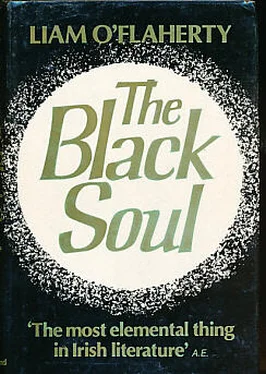Towards evening Little Mary came back to give him his supper. He saw her eyes gleaming with pleasure and her cheeks flushed with dancing and he was enraged with her. So he pretended to be indifferent. She noticed his jealousy and felt glad, because it showed her that he loved her.
‘Do come down with me,’ she said, clinging to him, ‘the people won’t like it if you don’t come.’
‘Oh, to hell with the yokels,’ he said, ‘I’m going in to O’Daly’s and have somebody to talk to. What do I want with a lot of stupid savages?’
Then he ate his supper eagerly, with a great show of nonchalance, and went out.
Little Mary tore off the trinkets that she had donned so gaily that morning and sat by her bed, moaning, ‘Now what have I done, now what have I done?’
He walked southwards from the village across the crags until he reached the cliffs. Then he turned eastwards towards the highest cliff, whose summit was crowned by the old fort that prehistoric warriors had built. He reached it. He passed through the two outer walls and then through the massive stone gate that led into the circular level greensward that was the fort itself. He stood still; there was perfect silence within the tremendous walls, in that circular bare patch of whitened grass, trodden by savage warriors three thousand years before. Four yards in front of him, the cliff dropped three hundred feet to a vast expanse of blue sea. ‘Ah,’ he said, and he felt strong and confident as if all the hosts that had ever looked out over that sea were beside him, defending him with their shields. He felt like a monk who sits in a vast empty cathedral communing with his god. He mounted the ramparts and lay on his belly along the broad wall of the fort looking out over Inverara. There were pale green streaks of light from the setting sun on the crags that sank in terraces from east and west and south to the broad grassy valley of Coillnamhan. The sea between Inverara and the blue mainland had a million dimples on its smooth face, kisses from the departing sun. The wide strip of sandy beach beneath Coillnamhan shone white, like the reflection of the moon at night in a tropical sea. White sheep, followed by their frisking lambs, wandered about the crags. Women in red petticoats crossed here and there with cans to milk their cows. The cows lowed. A pattering sound came from afar of somebody knocking a heap of smooth stones and a horse whinnied near there, eager for her evening drink of water perhaps. He gazed in silence, drinking in the beauty of nature. He wanted to embrace it, to hold it to his breast. Nature seemed to say, ‘See how beautiful is the world. Fool. You despise peasants, do you? You think you are an intellectual? I’ll tell you what you are. You are a charlatan. Go back now to the woman that loves you and enjoy life. It is good, but only to those who prefer truth to cheap cynicism and intellectual piffle.’ And the ghosts of dead warriors seemed to clash their battle-axes silently on their shields and murmur, ‘Aye, that is truth.’ And the crags and the sea and the sand and the green valley winking under the parting embrace of the sinking sun seemed to sigh and say, ‘Aye, peace and strength are only to those who can love beauty and truth. Beauty and truth are life. Life comes from our womb. Nestle close to us, my child. You will get lost in those clouds of vaporous intellectuality.’
And his Black Soul scowled at the accusing voice of nature. It said, ‘Intellect is above nature. I am above the common herd, these peasants of Rooruck. What purpose is there in being happy or in trying to believe anything? What do I want to tussle with the ignorant mob for?’ Then a great dark shadow passed westward from Kilmillick over the land and sea and blotted out the sun. A chill breeze began to blow. Shivering and depressed he descended from the ramparts and began to walk hurriedly down the slope towards Coillnamhan to O’Daly’s house. He was obeying the voice of his Black Soul. It was the most satisfying voice to his vanity. So it is easier to scoff at life than to give a child an apple. But scoffing, though sweet, leaves a sour taste in the mouth, and a child’s smile lives a long time in the memory.
The dark shadow had thickened into night before he reached the village. But he had ceased to notice anything about him. He was deliberately trying to persuade himself that he loved Kathleen O’Daly, that she was his equal in intellect, that her presence made him happy, that she had an elevating effect on his mind, and that Little Mary had a demoralizing effect on him.
‘That kind of woman would turn me into a yokel. She would kill all refinement in me. I must pull myself together.’ Then he knocked at the door of the cottage.
O’Daly opened the door to him and asked him to step inside in a whisper. He led him into the kitchen on tiptoe.
‘There’s a crowd o’ them in there,’ he whispered, gripping the Stranger’s right arm convulsively. ‘Take this chair. That old woman of a curate and another priest from Dublin, full of nonsense about Republicanism, and a young woman with a face like the spine of a tinker’s ass, relation o’ the curate’s, says she, “We need to enthuse the growing generation with a passion for pure ideals, and a clean unselfish moral life,”’ and O’Daly tried to imitate the voice of a robin whose nest has been robbed. ‘They’re in there in the sitting-room,’ he continued, breathing heavily as he filled an extra glass from a bottle that lay on the kitchen table. Then he handed the glass to the Stranger and sank into a bamboo arm-chair that cracked under his weight. ‘I stuck it for an hour. Couldn’t stand em any longer.’ He had obviously made an attempt to ‘stand it,’ for he was wearing a starched shirt-front and a fairly new black suit. But the stiff narrow base of the shirt-front was sticking out over his waistcoat that was unbuttoned. He had torn off his tie, and the collar-stud was hanging loose at his throat. His face was as red as a beetroot with his exertions. The poor man would have liked very much to stay in the sitting-room and poke blasphemous fun at the priests and the young lady with the face like a tinker’s ass’s spine, but his daughter’s stare told him that he was a ‘disgrace,’ so he had to retire. He was, after all, though ‘an Irish gentleman who feared neither man nor devil,’ as he said himself, afraid of his daughter and dependent on her. So he pretended that he really disliked the company and despised it. ‘It’s funny,’ he said, filling himself a fresh glass of whisky, ‘but the only people I feel like talking to are the peasants. They’re more human than these bastards that pretend to know everything, and know nothing. Eh? Isn’t that right?’
‘Absolutely,’ said the Stranger, swallowing his whisky. ‘I quite agree with you,’ he repeated with gusto, though an hour before he had told himself exactly the opposite. ‘I feel as if I never wanted to leave Rooruck again.’
‘Proper order,’ said O’Daly, and he swallowed another glass. ‘By God, this talk about pure ideals gives me the colic. None o’ that in my time. Fellahs’d be ashamed to talk like that. May the devil swallow them and their ideals. Begob, yer a poor drinker. Hold yer glass over here. Woa, I’m spilling it, “the precious fluid,” as old Father Mulligan used to say, God rest his soul.’
Now and again a subdued laugh came to them from the sitting-room as they drank. O’Daly, already half-drunk, had forgotten all about the party in the sitting-room, but the Stranger listened to every sound eagerly. It was as if he was eavesdropping on the civilized life that he once knew. He had forgotten about his pretended love for Kathleen. She again took her proper position in his mind, merely as a symbol of the life after which he hankered. And as usual, when he was listening to the voice of civilization, he told himself that he didn’t want it. In fact, he pitied O’Daly, who was forced to live in such surroundings, and he kept drinking eagerly. Then the guests went away.
Читать дальше












